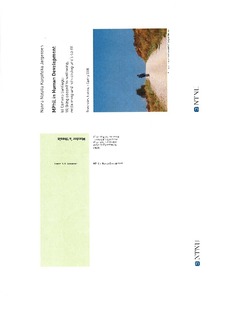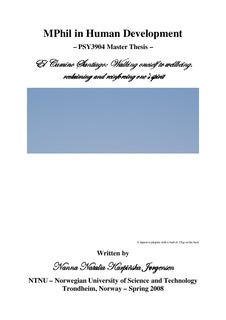| dc.description.abstract | In this respect, this thesis presents a tool how people independently can learn how to handle different life challenges and difficulties, along the centuries-old pilgrim route, El Camino Santiago de Compostela, stretching itself across Northern Spain. At the same time, it will disclaim the oppositions and scepticisms in certain psychiatric communities to this kind of alternative self-help therapy, and argue for its need and approval by describing and documenting its beneficial effects. Since pilgrimage, or long-distance walking, is not a well-known phenomenon nor established form of psychological treatment in Norway – being mainly associated with religious practice and penance – a multi-disciplinary existential hermeneutic approach to has been taken to step-wise explain Camino’s true nature and walking processes based on participant observation visits to the field and iterative analysis of cross-cultural case interviews – out of which the most relevant results are presented here. It appears people traverse this way for far spiritual than religious motives. People walk it for highly personal reasons, expecting the journey to bring emotional healing or a mystical transformation to their lives, hoping they will find peace, their true sense of self and the answers to their existential questions not easily found in our stressful life. Through the physical act of walking, and in the spiritual and social encounter with nature and other meaning-seeking individuals on the Camino, people experience wellbeing, living in the moment and a coherence with their soul and surroundings, eliciting self-dialogical processes making them re-evaluate and get new perspectives on their lives. The experience makes them more reflective and assertive of themselves and their future, realizing their life meaning and force is found within; that they can accomplish more than they think by simply using their own resources. The Camino has thus a self-developmental and –regulating quality, where the spirit grows by walking in the unification and equilibration of the mind, body and soul – whose natural interrelation is being neglected in our part of the world. Hence this work also seeks to promote the Camino, or long-distance walking in general, as a form of therapy, hoping the Norwegian Psychiatry and Psychological Academia will acknowledge its healing and holistic potential, and importance to knowledge and society as a whole. | nb_NO |

